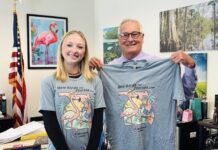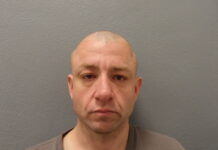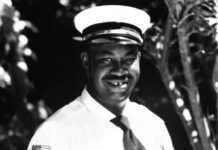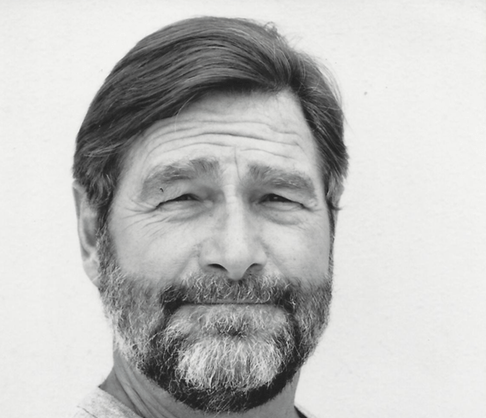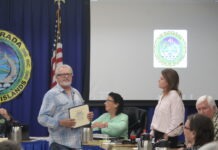Living inside prison walls for the past 31 years, Richard “Dickie” Lynn’s chances of freedom seemed unknown. The work never stopped, however, in getting the convicted drug smuggler out on a life sentence that many believed to be too harsh.
With help from local residents, retired Drug Enforcement Administration agents, a nonprofit and two law students, however, the tide recently turned for Lynn. On June 29, he rode the wave back to his Keys home.
Many who know the Islamorada native’s story believe a life sentence didn’t fit Lynn’s nonviolent crimes. Even federal agents who investigated and incarcerated Lynn back in the late 1980s were among those who believed the sentencing was excessive and vindictive.
Recently, U.S. District Court Judge William H. Steele, of the Southern District of Alabama, granted something many who supported Lynn long hoped for — compassionate release. Steele ruled that Lynn be set free on June 29, due to his serious health issues and because his time spent in prison was enough punishment for the crimes committed.
In 1989, Lynn was arrested and charged with conspiring with others to import and distribute marijuana and cocaine into Alabama. He was offered a plea agreement for a life sentence by Jeff Sessions, then U.S attorney. Lynn declined a plea deal, like many others in his ring did, and elected for trial. He was found guilty on seven of 17 counts, however, and sentenced to life.
Following Lynn’s conviction, prosecutors wrote to the judge urging a sentence of seven life sentences. That led Lynn to flee a temporary facility where he was housed. He was caught six months later in Mississippi. His flight erased any chance at appealing his sentence, which led Lynn to cooperate with drug task force agents. Islamorada Vice Mayor Ken Davis, a former DEA agent who studied Lynn’s case, said his cooperation led to the capture of two highly-sought drug kingpins.
Despite the cooperation, Lynn was the only one who received a life sentence out of the 21 serving prison time for their roles in the smuggling. In his first act as a councilman in November 2018, Davis urged council to send a letter to President Donald Trump supporting clemency for his release. He also wrote a letter supporting compassionate release.
“It’s about time for him to come home,” Davis said, following the judge’s order. “He did everything he should have done. He should have gotten a Rule 31 hearing, which is a reduction in sentence for cooperation and admission of guilt. But the prosecutor had it out for Dickie Lynn.”
Davis noted that many people worked hard to get Lynn freed, including Amy Povah, who put together the clemency package and helped get compassionate release for Lynn. Povah was a victim of an excessive sentence and received clemency in her own case from President Bill Clinton on July 7, 2000. She served nine years of a 24-year sentence for conspiracy in an MDMA (ecstasy) case.
Povah was 28 when federal agents burst into her home and demanded that she either cooperate with their investigation into her then-husband, Sandy Pofahl’s illegal operation to manufacture ecstasy, or face an indictment for conspiracy that would mandate a sentence of 20 years to life.
In the 1990s, Povah said, no one had a handle on how cases were prosecuted, nor the conspiracy law that puts someone who had the smallest participation in a position of guilt for the actions of all co-conspirators. Post-release, she opened up a nonprofit, advocating for all nonviolent drug offenders, known as Can-Do Foundation – Justice Through Clemency.
“If you name names, you’ll get leniency, if you don’t, they will destroy you. Dickie is a victim of that,” she said. “We worked with the Trump administration, as we did with the Obama administration to get him released. We were making progress and the pandemic hit, and there wasn’t much movement.”
Assisting in the effort were Katie Tinto, clinical law professor at the University of California-Irvine, and third-year law students Julienne Pasichow and Harrison Weimer, who jumped onto Lynn’s case in the fall of last year. Tinto said it was a local news article on Lynn that drew her and the law students to the case.
“We just had success in a compassionate release in Texas, and I realized this was a powerful tool,” she said. “I was wanting to do other clients, particularly those serving life, because there aren’t many people who deserve that, especially for drug trafficking.”
Reading up on Lynn, she realized he had support from local officials and the community. Tinto and the students wrote to Dickie to see if he was interested in their help. A new effort began.
“Compassionate release is a two-step process. The first is asking the prison to release the client. The prison came back and said ‘no,’” Tinto said. “Under the First Step Act, you are allowed to request compassionate release from the judge, and we basically ghost-wrote the motion for Dickie. He submitted it to the court and that’s what the court granted.”
Lynn previously sought compassionate release, but was denied. Tinto said the timing was right in filing the new request because Lynn qualified, as he was over 65 and his health was deteriorating due to a heart condition.
“Frankly, I was shocked,” Povah said upon hearing of Lynn’s release. “Dickie had told me his compassionate release was denied. The next thing I know he was granted. It was definitely music to my years.”
Povah said many people were in Lynn’s corner, but it was very frustrating as his case was “so perfect with four DEA agents supporting it.”
“It’s rarely ever done, if ever. It wasn’t just one. It was four,” Povah said.
Tinto said she works with many prisoners who quickly become alone and have no community or family backing them, especially as time moves on. But after 30 years, Lynn continues to have loving and community-wide support.
“I’m sure it’s kept him going all these years,” Tinto said.
A Facebook page for Dickie, called Release Dickie Lynn, is currently securing welcome-home gifts and awaiting his appetite for seafood. On June 23, a message from Lynn was posted to the page thanking all who supported him along the way.
“There are so many that I’d like to acknowledge but I would be writing all day and some I want to thank in person for their everlasting love and devotion over the years,” he wrote.





